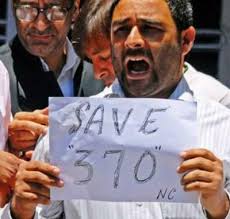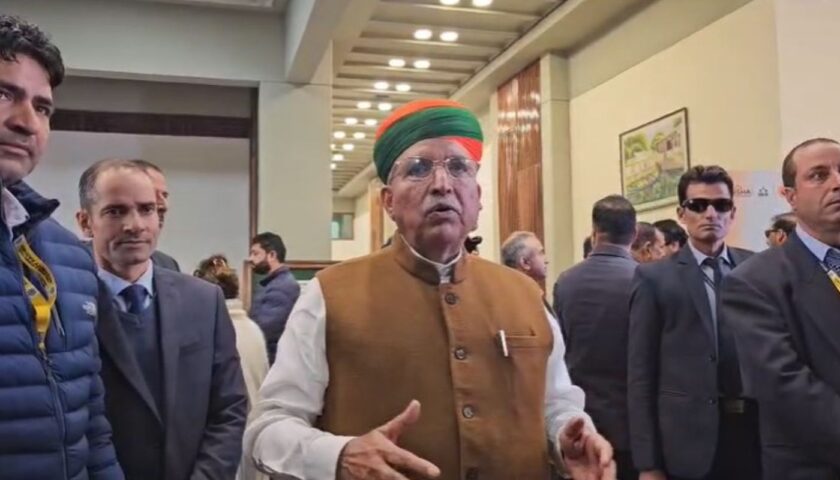- RS passes bill empowering GoI to collect statistical data from JK
- Opposition says move overrides JK’s special status
Further eroding Article 370, which accords a special status to Jammu Kashmir, Rajya Sabha Wednesday passed amendments in the Collection of Statistics (Amendment) Bill, 2017, in the Parliament for applying it to the Jammu Kashmir.
The decision comes within three weeks of the passage of the controversial Goods and Services Tax regime in the State despite protests by opposition and traders who over fears of compromise of State’s fiscal autonomy.
Before the bill was passed, Congress’ Member of Parliament from Andhra Pradesh, Jairam Ramesh in his speech in the Rajya Sabha, the upper house of the Indian bicameral parliament, said the bill would erode Article 370 of the Indian constitution that grants special autonomous status to Jammu and Kashmir.
Ramesh, a former union minister, said State government should be consulted “for the spirit of Article 370.”
“This will be good for your (BJP) government in Jammu Kashmir and this is in your (BJPs) interest,” he said.
Daniel Raja, the Communist Party of India (CPI) MP from Tamil Nadu echoed Ramesh’s views and urged the government to engage with the Jammu Kashmir government regarding the entire exercise.
Urging Government of India (GoI) to be mindful of the sensitivities of Jammu Kashmir, he said the amendment bill should be in accordance with Article 370 of the Indian Constitution.
K Rehman Khan, a Congress MP from Karnataka said the government should in the national interest see that the Article 370 is safeguarded just as other clauses that accord special residuary powers to other North East states are protected.
Khan, a former union minister and former Deputy Chairman of Rajya Sabha said GoI was only after Jammu Kashmir and did not care about the sensitivities of the State.
Speaking on the issue, Leader of Opposition in Rajya Sabha and senior Congress leader, Ghulam Nabi Azad said the BJP-led government at New Delhi should keep the sentiments of people of Jammu Kashmir in mind.
“We are all for this bill but we have to be mindful of the constitutional nitty-gritty of Jammu Kashmir and understand the sensitivity of the State,” Azad, the former Jammu Kashmir chief minister, said and sought deferment of the passage of bill for the time being.
Urging GoI to take the Jammu Kashmir government and people of State into confidence first before passing the bill, Azad said such a decision should not be taken in a hurry.
At this time, Minister of State for Parliamentary Affairs and the rightwing BJP Vice President, Mukhtar Abbas Naqvi said, “We are taking care of all the sentiments of the people of Jammu Kashmir.”
Jammu and Kashmir State legislature has powers to enact laws on statistics which falls under the concurrent and residuary powers reserved for the State under the Constitution (Application to Jammu and Kashmir) Order 1954.
The Collection of Statistics Act, 2008, and the Jammu and Kashmir Collection of Statistics Act, 2010, are not applicable to the statistical subjects falling in the Union List, as applicable to Jammu Kashmir under the 1954 order.
However, Minister of Statistics and Programme Implementation, Devaragunda Venkappa Sadananda Gowda told Rajya Sabha that the Presidential Order of 1954 on the statistical subjects comes under Government of India’s domain.
“We are not doing anything unconstitutional,” he said. “We are doing it in the constitutional spirit.”
Gowda also took a jibe at Azad saying that it was his cabinet that had cleared the decision to implement this bill and when Government of India had written to the Jammu Kashmir government he was heading for its clearance, they had not given any reply.
“This time too, we wrote to Jammu Kashmir government but they again did not reply,” he said. “So we cannot keep waiting and we are well within our powers to pass the bill.”
Following this, the bill was passed and no one from the opposition opposed its passage.
The bill was already passed by Lok Sabha in April this year.
The passage of another controversial bill relating to Jammu Kashmir comes within 21 days of the passage of the new GST regime in the State which had evoked protests from the opposition and traders fearing erosion of State’s fiscal autonomy.
While GST was rolled out across India on July 1, Jammu Kashmir continued with the previous tax regime until July 8.
The entire opposition as well as Kashmir Inc. had been critical of the government saying the Constitutional Amendment 101 under which the government aimed to implement the new GST regime in the State would impinge upon fiscal autonomy and Article 370.




